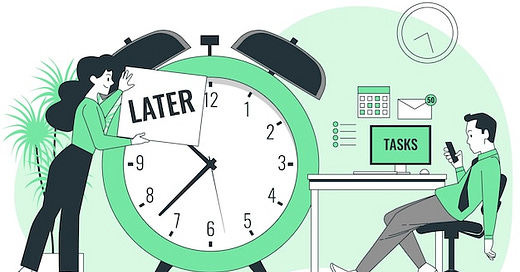Breaking the Cycle of Procrastination
Why we keep the task into the "last minute" knowing that it's important.
Everyone procrastinates at some point of time. We deliberately put off the work which is important. We do several others things like cleaning room, talking to a friend, checking social media, but not the important thing.
We gives unnecessary excuses and postpone the work till the deadline is about to approach. We finish the task and think not to postpone next time. But we fall in the same pattern again.
Not just common people even great achievers also procrastinate. So how we can beat it, is an important thing to discuss but first we should know why do we procrastinate?
Studies reveal that the reason behind procrastination is related to emotions, cognition, and behavior. Here are a few key psychological reasons behind procrastination:
You avoid doing a task because you find it boring or not interesting. That daunting task makes you feel drained and you find no kick doing it. So you delay it replacing with some enjoyable activities.
We sometimes face decision fatigue. We can’t figure out when to start, where to gather information, how to reconcile all the data and we postpone the task to cause mental strain further.
“Perfectionism is the fear of being criticized.” - Caroline Myss
Perfectionists procrastinate the most. They would prefer to postpone the task than making it imperfect. They fear that they would not make it to the mark and in order to prevent anxiety of failure, it’s safe side not to do the task.
Some of us struggles with time management and underestimate the time we require to finish a task. We think we finish a task devoting less time, but in reality it takes long hours of attention. Then we get out of time and abruptly we finish the task just before the deadline.
In this digital world we are succumbed to instant gratification. We do the task we get the reward that’s what we expect. So when we involve in some big project or long task, the reward is not instant. It takes time and that’s what makes to procrastinate.
How to Beat Procrastination
Procrastinating is a deep rooted habit, so it’s hard to get rid of it but not impossible. You can overcome it implementing some strategies and start procrastinating less.
Break Task into Small Chunks: Large tasks can feel overwhelming, which encourages procrastination. Break the task into small chunks and start doing those small portions at a time, reduces anxiety and provides a clear path.
Address Your Emotions: Since procrastination often stems from emotional regulation, it’s important to manage your emotions. If you feel anxious or stressed about a project, practice self-compassion and self-forgiveness by acknowledging your feelings without judgment. It will reduce negative emotions and create a calmer mindset. Find the aspects of the task you’re avoiding and make it less intimidating.
Create a Productive Environment: Create a clean, organized, and distraction-free space for yourself. Put your phone on silent, close unnecessary tabs on your computer, and remove anything that is distracting away from the task.
Power of Rewards: We are motivated by rewards, so reward yourself after completing tasks. Whether it’s a small treat, a break to watch your favorite show, or a walk outside, rewards help reinforce positive behavior. Make sure your rewards are tied to progress, not perfection.
Shift Your Focus from Perfectionism to Progress : If perfectionism is contributing to your procrastination, try to shift your mindset. Rather than waiting for the "perfect moment" or aiming for a perfect piece, focus on making progress. Accept that mistakes are a natural part of the process and that taking action is far more effective than waiting for perfection.
Procrastination is something we all deal with, but it doesn’t have to dominate our lives. By implementing these strategies, you can train your mind to overcome procrastination.
It’s a gradual process, and setbacks will happen. Be patient with yourself and continue to apply these strategies to make meaningful progress. By making small, sustainable changes, you can gain control over your habits and boost your productivity in the long run.
Till then,
Have a good day!





